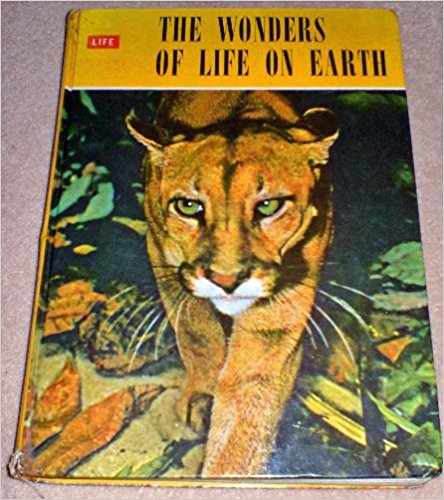The question posed for the next issue of the newsletter is “Which book on Zen (or Buddhism generally) has had the most impact on your life and practice and why did it particularly resonate with you?” Here we have the first contribution on this question, as Andy Tanzan Scott pays tribute to the life-long affect of a very special book from his childhood.I remember receiving it in its large, close-fitting brown cardboard case; it came by post. All very Amazon, very ordinary today but not 50 years ago. This was special. And the excitement on opening the parcel and the cover photo, a night shot of a large cat, a puma walking towards the camera. ‘The Wonders Of Life On Earth’ was a lavishly illustrated Life publication with multi-page fold-out colour dioramas. I couldn’t put it down and pored over The Book for hours; I was ten years old. Looking at it now, I’m not sure how much of the writing I then understood but I ‘got’ the pictures and the story.
The Book was an account of Charles Darwin’s voyages as a young naturalist on HMS Beagle and his explorations of the rainforests of South America and the Galápagos Islands of the Pacific. It was, if you like, the backstory to the writing of Origin of Species and the development of his idea of natural selection. And it blew my mind. By the age of eleven I was not only a passionate Darwinian evolutionist, I was a convinced atheist. Then, as now, what need did I have for a made up God or the puerile carrot and stick of Heaven and Hell?
Reflecting as I write this, it is fascinating and surprising how much of my life has been influenced by The Book. It fed my lifelong interest in nature, it led me to my first degrees in environmental sciences and ecology, and, I see now, it led me to Zen. Freed from any attraction towards theism, I read voraciously in my teens searching for meaning: the Beat poets, Capra’s ‘The Tao of Physics’, Papanek’s ‘Design for the Real World’, and especially Hesse’s ‘Siddhartha’, I devoured them all.
When I did discover Zen, the chant that most affected me was the Verse of Atonement. Or At-One-ment, realizing our connectedness. The story of The Book and indeed of natural selection is about cause and effect. All life is shaped by interaction. We talk of adaption but that is changing towards something; this is too purposeful. A better term is abaption – change caused by interaction – between organisms and the changing environment, and above all between humans and the planet. We are, and always have been, responsible for our actions. There is no God given right of dominion over the creatures of the earth, only the current unfolding catastrophe of extinctions and habitat loss which we are causing. Karma in action.
I can’t do anything about the millions of tonnes of plastic in the oceans, alas, but I can try and atone by mindful action on a daily, moment by moment basis. And I can plan. I have already decided that one of the first objects I would rescue in a fire is The Book.

